18 reasons why we should head back double-quick to France

The French aren’t expecting us this year. I suggest we surprise them. Pre-Covid, the British were France’s number one fans, just ahead of the Germans and Belgians. The 2019 figures show that 13 million of us travelled thither. OK, this is slightly misleading: the 13 million included those who spent just one or two nights there, en route somewhere else. And if the same person made two trips to France, he or she counted for two in the 13 million. But, winnow out the ambiguities, and it was still a lot.
Last year, of course, the numbers fell off a cliff. And this year the French have been assuming that British arrivals will remain at ground-level. I live in France and hear continually that, in 2021, international visitors are an endangered species. But – suddenly – all that may be about to change. On Thursday, France’s amber-plus status, which was adopted by the UK government due to concerns over the beta variant and required returning Brits to self isolate regardless of vaccine status, was brought back down to amber status. This is tremendous news: now the double-jabbed will no longer have to quarantine on return. (Although they must still – as with other amber-list destinations – take a pre-departure test before returning to England and pay for a PCR test on day two of their return, as well as completing a passenger locator form. Which is irritating, but not entirely insurmountable.) At last a window of opportunity has opened – and you might like to take advantage. Here are my favourite reasons why...
It’s easy to get to
Take a ferry, a train or a plane and you’re there in a couple of hours. Well, you are if you’re from London, but not everyone is from London. Some are from Preston – which means, train-wise, factoring in an extra three hours, an additional £50pp (minimum) and a certain amount of faffing each way. But, even so, this is scarcely jet-lag territory – and then, there you are, in an entirely different country with different smells (though I still miss the ambient Gauloises smoke which wafted through until the 1990s), proper pavement cafés, lust-fuelling food shops, mountains, rivers, sea and a puzzling admiration for the late Johnny Hallyday. It is both entirely different and quite the same – hygiene, security, that sort of thing – and it’s right next door.
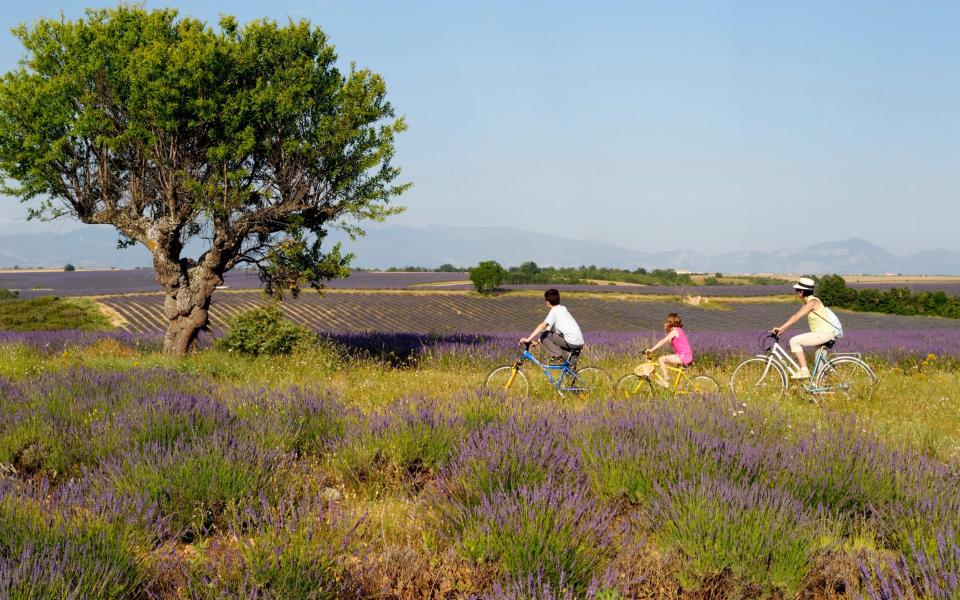
Outdoor pursuits abound
I’m as far from being an action man as is consistent with the possession of limbs, but have, in recent times, rafted upon white water, hiked significantly and cycled great distances. France encourages such activities by laying on the perfect terrains. It is Europe’s adventure playground. Provence is the epicentre where, between climbing, gliding and mountain biking there’s barely time for selfies. I fancy a crack at canyoning this year. “At your age?” cried my wife. “I’m considerably younger than the queen,” I said. “Everyone is,” came the reply. “And she doesn’t jump off rocks in a helmet.” If I do get free, I’ll contact Roya Evasion in the Roya valley north of Nice. They kept me alive during the rafting.
It has brilliant beaches
It is de rigueur these days to maintain that beach holidays are out, and that more active, worthwhile breaks (museums, rock-climbing, yoga courses) are in. Yeah. Right. So who are all these hundreds of happy people before me on the sands at Palavas? Mirages? Take no notice. Beach hols remain bang on trend, and France has Europe’s best variety, from the rocky northern coast of Brittany, via the surfer-central stretches of the Atlantic coast down to Basque country and across to the Med coasts of Languedoc, Provence and the Riviera. There’s bound to be one that suits. Two hints: private beaches are a rip-off. Why pay up to 50 quid a day for a lounger on Pampelonne beach, St Tropez when you can lie on nearby public sands for free? And if your complexion is, like mine, typically British, please apply suntan lotion to the thickness of an anorak.
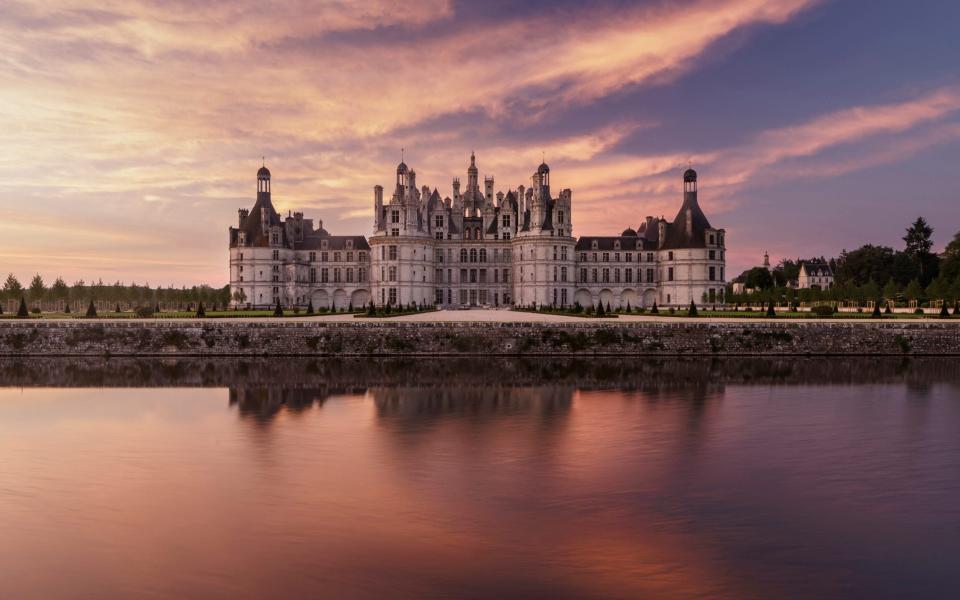
There is culture – lots of it
The French take culture very seriously. An example: though the Loire châteaux throbbed with sex, stabbings and world-class parties, you’ll rarely learn that from a French guide. They’ll be concentrating on corniche mouldings and window decoration. There is a reason. At some folk level, the French know that the past and its culture provided the structure for present-day “project France”. To treat either with levity would risk leaving the nation rootless. Thus, more than most other peoples, they devote enormous energy to maintaining the framework of France. That ensures that visitors have a quite extraordinary range of interesting things to look at. Read up about the sex and violence yourselves.
The lunches are great
The revisionists are a lost cause. Either, like me, you consider French food the finest in the world or you don’t. You reckon that it’s gone down the tubes and no longer rivals what’s available in, say, Nottingham. Let’s agree to disagree, and turn to the French summer lunch, upon whose greatness I cede to no-one. Whether it be roigabregaldi (spuds, onions, butter, lardons, smoked pork) on the terrace of an Alsacien mountain inn with uninterrupted views over the uplands, pike-perch in white wine by the Loire river or a swordfish steak, with a bottle of rosé, at Le Président between the port and Med beaches of La Londe-les-Maures, I defy you to find a better way of spending the sunny midday hours – and prolonging them indefinitely.
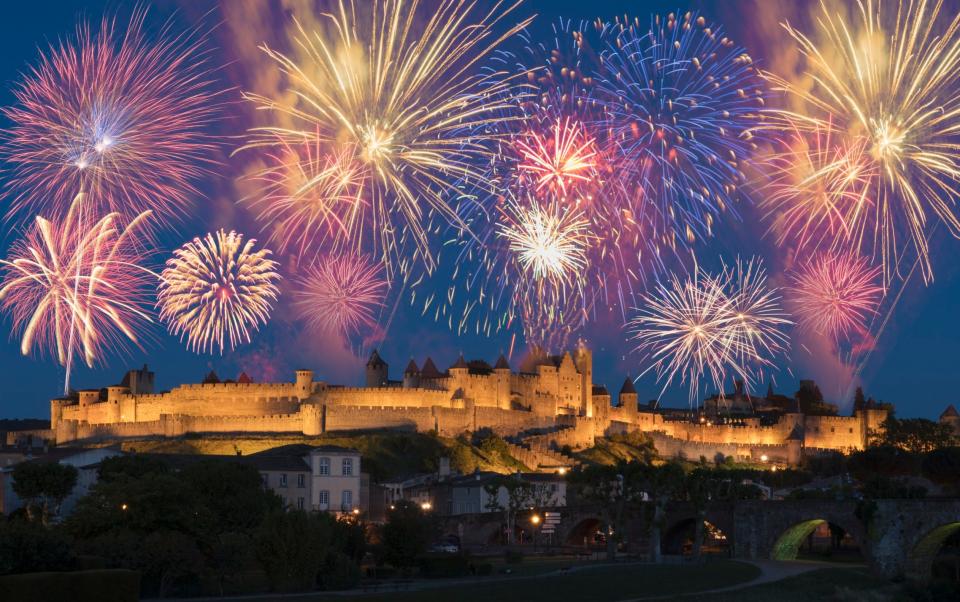
The French know how to put on a show
A French summer without festivals is like a soccer match without goals – interesting enough but lacking the bits which get people really excited. That was 2020. In 2021, many festivals are back, in slightly attenuated form, to nourish the summer. Avignon’s drama fest, essentially Edinburgh-on-Rhône, has been and gone but still to come is France’s major sacred music festival at the extraordinary St Robert Abbey at La Chaise-Dieu in Auvergne (August 19-29). If you can’t get there, there’s another lovely sacred and world music fest at Sylvanes abbey in the Aveyron, to August 29. Classical music breaks out around Rouen in Normandy in 30 concerts to August 29 while the Celtic fringe moves centre-stage at the Interceltique festival at Lorient, to August 14. The Festival des Filets Bleus at Concarneau, August 13-15, likewise majors on Celtic music in the only festival anywhere inspired by an absence of sardines (long story). Look out for the heavy metal – including Phil Bastard and the Bastard Sons – at the Festival666 in Corcoux, Charentes (August 20-22) – and open air jazz for free in the Parc Floral in Paris to September 8. Above and beyond, almost all of France’s 36000 communes have their own fêtes and festivals. Ours boasts bull-running, moonlit dancing and, later, appearances by David Bowie, The Cure and The Rolling Stones. The words “tribute acts” are written very small.
You can take your pick of accommodation
France is the world’s number one holiday country. Naturally, it has the widest possible array of staying options. Cheapest is to be welcomed by friends living in France. They’ll be happy to see you – otherwise they’d have made up some lie to keep you away – but it might help if you take a present (if you don’t know what, you’re probably not close enough to warrant a week’s freebie) and, after day three, consider contributing to the food budget. Hotel-wise, rat-hole establishments, once the scourge of big cities and remoter parts, are now rare, and chain hotels worth considering. “Soulless,” it is said – but, if they provide clean linen, I’ll provide the soul myself. Meanwhile, the Mama Shelter designer mini-group is as groovy as you like and, in Marseille in summer, from £94 a double room. Longer stays maybe require a gîte – many British companies have cracking portfolios – a chambres-d’hôtes B&B or a campsite, of which France has more than anywhere, bar the US. They’ve certainly moved on from the days of character-forming squalor. La Sirène is one of 54 sites in Argelès-sur-Mer, French camping HQ. The chalets there have comfort sufficient for the civilised. For more inspiration, see Telegraph Travel's guide to the best hotels in France.
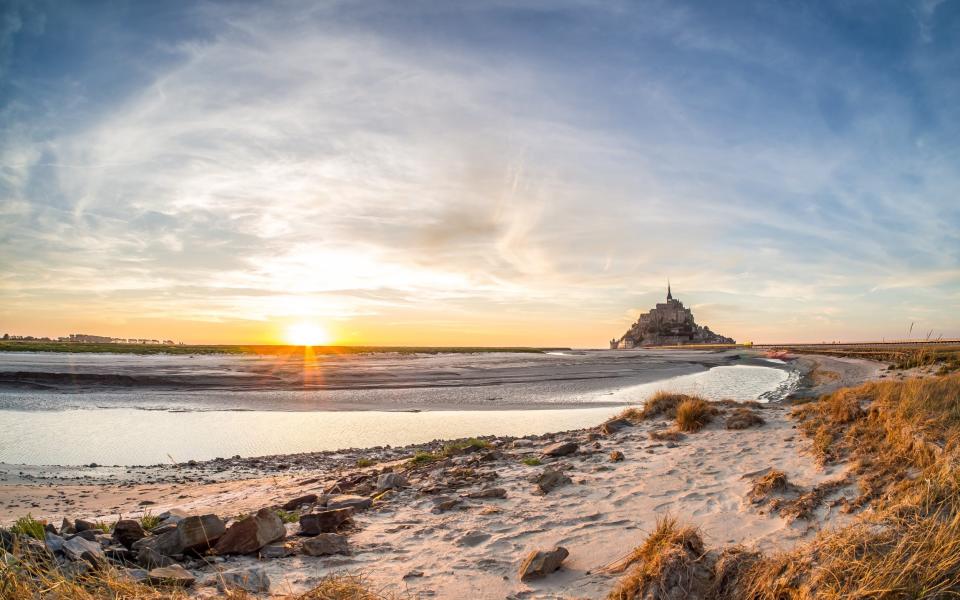
There is splendour at every turn
France looks after its monuments as it cares for its culture, and for similar reasons (see above). Touring France, you’re forever bumping into splendour. My Magnificent Seven starts in Paris where, during the forced unavailability of Notre Dame, the nearby Sainte Chapelle indicates the medieval French grasp of the sublime. To the east, I’m wrapping the cathedrals of Reims, Metz and Strasbourg into one as the driving force for a terrific Gothic rail trip on the TGV Est. On the border of Normandy and Brittany, the Mont Saint Michel has apparently landed from a more majestic dimension while Chenonceau is the most elegantly feminine of the Loire châteaux. That said, my favourite feminine castle of all is Milandes, once Dordogne home to Josephine Baker. Also in the south, the Pont-du-Gard and Millau Viaduct both seem to be completing nature’s designs for their respective sites, one two thousand years ago, the other in 2005. Look out for a wine festival and light show at the Pont-du-Gard on summer Wednesday evenings to August 18.
It is un-woke
I may have missed it but, as far as I can tell, the French feel that there is little to be gained from judging the past by the standards of the present, that pulling down statues is like burning history books, and that only a nation unsure of itself would surrender cultural control to wild-eyed zealots of very little brain. This century, incidentally, the city of Montpellier has erected statues of Lenin, Mao, FDR, Golda Meir, Churchill, Mandela, de Gaulle and Gandhi. If such a catholic approach sounds like you, you should find France a relief.
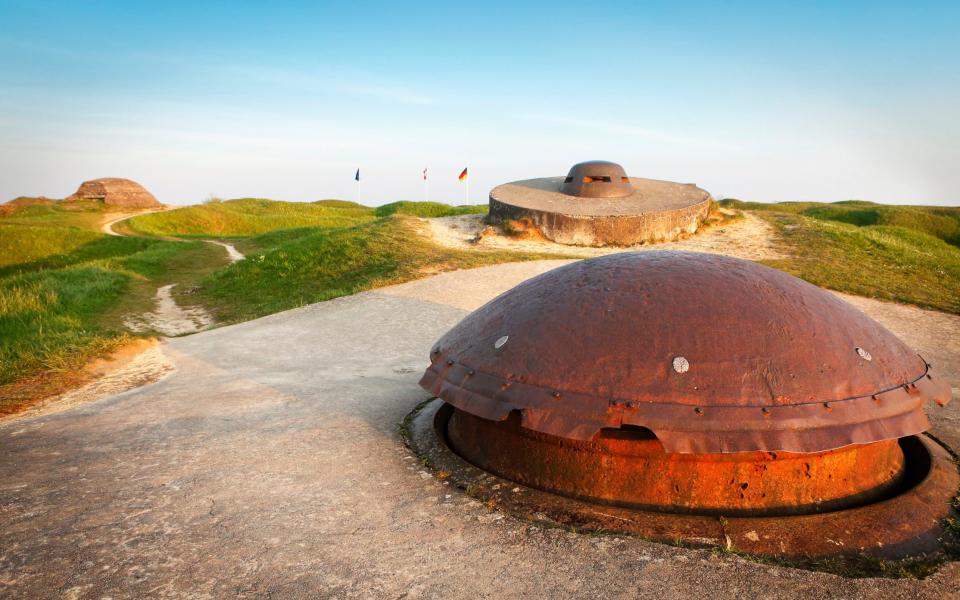
You can pay your respects
Telegraph readers won’t need me to underline the necessity of visiting the sites where the good guys fought and died – especially poignant on the D-Day beaches this year with the inauguration, at last, of the British Normandy Memorial at Ver-sur-Mer. A comprehensive tour might move from there to the Great War battlefields – the Somme, Arras, Vimy Ridge, Wellington quarry - and onto Verdun whose ossuary, abandoned villages, Douaumont fort and recently-renewed memorial museum underline French sacrifices. Taken together, these may constitute the most moving trip you’ll ever make.
British people invented French chic
British high-rollers have been swanning in since the bilious Tobias Smollett lead the way in the 18th-century, followed by former Lord Chancellor Lord Brougham in the nineteenth. Brougham began the fashioning Cannes for the fashionable. They still show up, though democratisation has set in. In truth, the Riviera’s great achievement has been to perpetuate the idea that everyone is fab and glam while catering to the fact that most aren’t. Pick carefully, and you may sleep and eat in Nice as cheaply as on the Fylde coast – though there’s a sparkle in the atmosphere you don’t get in Thornton-Cleveleys. But surely it’s concrete end to end, no? Nonsense. Aim for the Esterel Corniche between Cannes and St Raphaël. Here, humanity hangs on where it can amid defiantly rugged territory – the Riviera as it was before it became the Riviera.
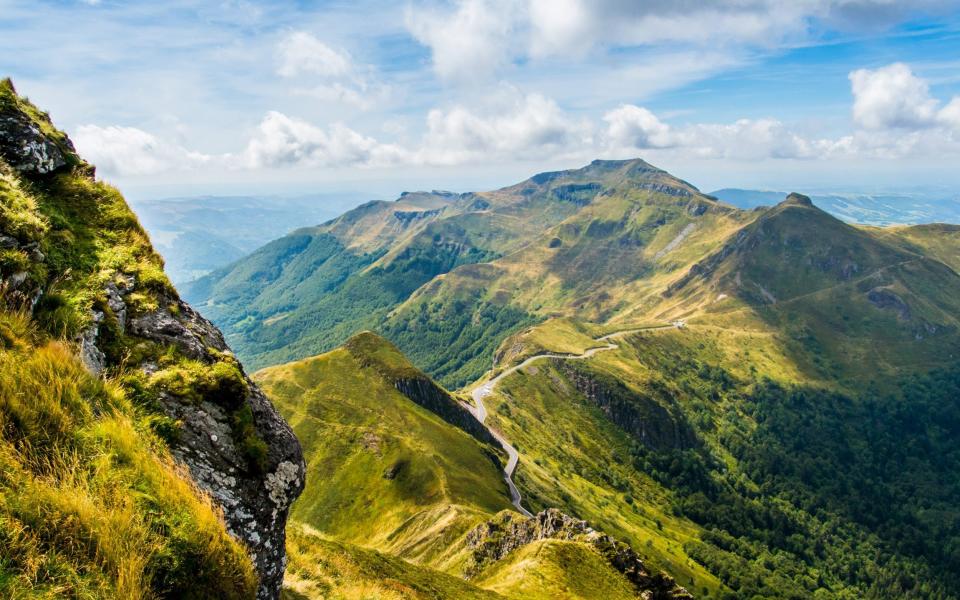
The landscapes are many and various
France has them all, save a vast desert. You want mountains, rivers, hills, plains, lakes, flat coasts or coves, cliffs, forests, volcanoes, great estuaries alive with bird life, garrigue, or endless fields of wheat, lavender and vines? France has world-class contenders in almost all categories. Driving north-west to south-east, for instance, you might start at the vast Somme Bay – transport hub for William the Conqueror, seals and every bird on the move – continue via the Loire valley, where France’s wildest river provides the running commentary, to the extraordinary volcanoes of the Auvergne, the limestone causses plateaux of Mongolian vastness, on through the tough Cévennes hills to the Languedoc plain, Rhône valley and Provençal uplands. And you’d still have the Côte-d’Azur to come.
The weather is reliable
I am writing this in Languedoc where, at present, the sky is untrammelled blue and the temperature 34°C in the shade. It will remain so, give or take, through most of the summer. In Preston, where I used to write, showers are forecast. Your choice, all the same.
The villages are charming
For reasons too long-winded even for me, French villages have retained proper lives. Not all, of course. Some have become dormitories. Others have suffocated: if a given village has more ceramists than grocers, it is clinically dead. But thousands remain vibrant and complete unto themselves. They will have most of the following: a baker’s, a general store and a weekly market; a mayor bustling about being important; a local wine, cheese and maybe micro-brewed beer; a bar-tabac equipped with lottery tickets, old blokes smoking under the “No Smoking” sign, and photos of the soccer team c. 1971; a pétanque pitch; a château, church or ramparts once visited by Joan of Arc, Henri IV or Vauban, and a summer fête with food, drink and dancing for days.
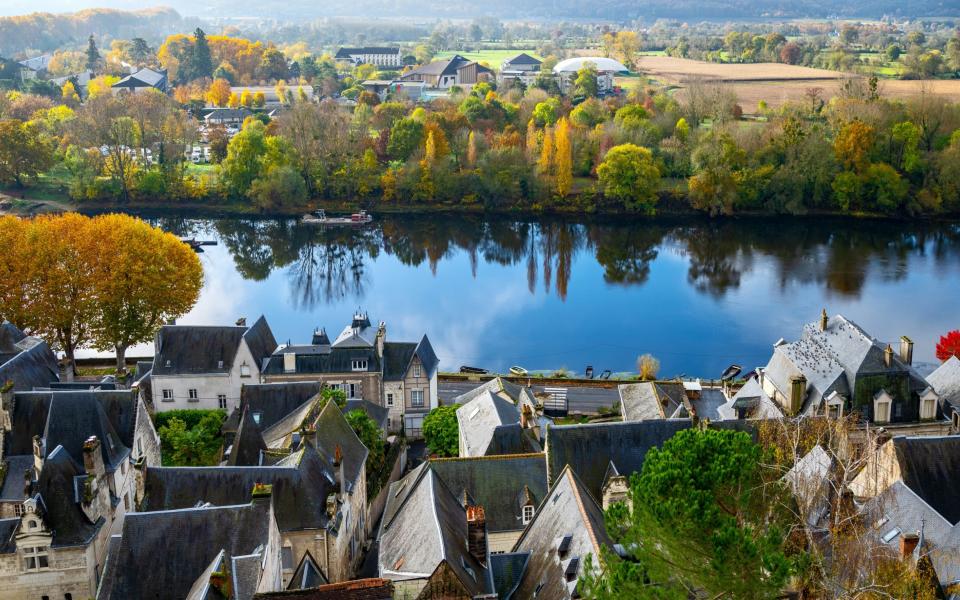
British history
Our links with French soil started well before the two world wars. In around 1028, William the Conqueror was born in the château at Falaise – not the one that’s there now but an earlier version on the same site. He set sail to conquer England from St Valéry-sur-Somme and what’s left of him (a thighbone, apparently) is buried in Caen. Our Plantagenets originated from Le Mans, where Henry II was born in what’s now the town hall. He spent a lot of time at Chinon château – on the River Vienne – and much longer at nearby Fontevraud abbey, where he was buried. So was his queen, Eleanor of Aquitaine and son, Richard the Lionheart. It’s an uplifting visit, as is that to Historical Centre at Agincourt (or “Azincourt”, as the French say) where, rather decently, the French have a contemporary museum covering the Hundred Years War and, specifically, the 1415 battle in which Henry V gave them such a pasting. And gentlemen in England now abed / Shall think themselves accursed they were not here. That’s putting it a bit high, perhaps, but the museum is pretty terrific, all the same.
Theme parks
The last time I was at the Cinéscénie – the night-time show at the Puy-du-Fou theme park in the Vendée – I sat next to a lady from the Las Vegas tourism board. Across a 57-acre “stage”, the world’s grandest outdoor spectacle retold French history with 2500 actors, thousands of costumes, countless horses and other animals, lights, explosive music and fireworks. It was awe-inspiring. Or in the words bellowed by the Las Vegas lady as she sprang to her feet at the end of the show: “That, ladies and gentlemen, is what I call entertainment”. Add in that the daytime Puy-du-Fou theme park has the best range of spectacles I’ve ever seen – from chariot races in a full Roman arena via Viking and medieval battles of stunning horsemanship through to Great War reconstructions – and you set a gold standard for theme parks. Elsewhere, Disneyland, Parc Astérix, Futuroscope and Vulcania are pretty ace, too. I’ve been to most and, as they’ve all re-opened for 2021, I’d like to think I’ll be going again.
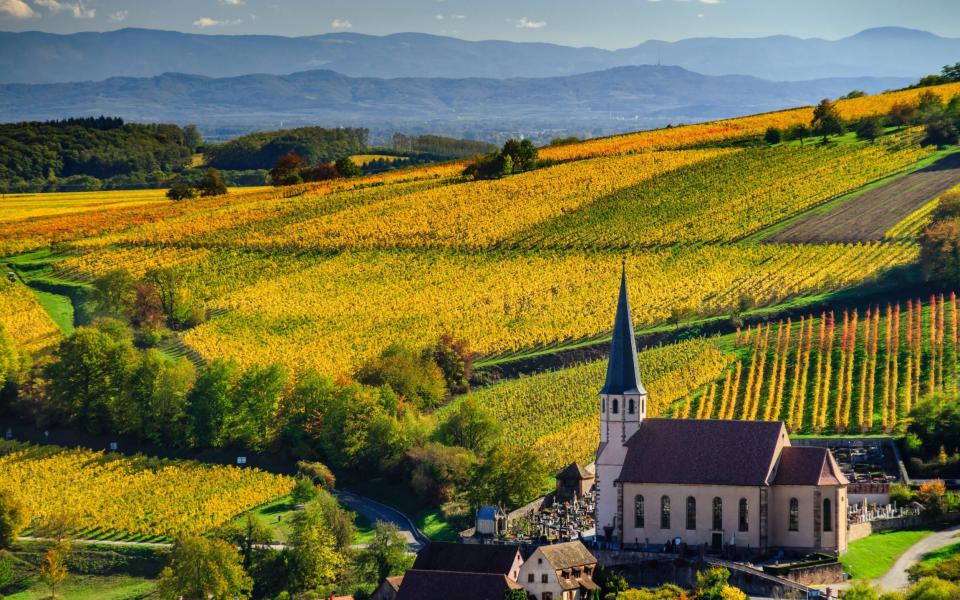
Wine. Need I say more?
Wine-wise, nothing beats tasting in the cellars, and company, of the people who produce it. France offers more, and more varied, opportunities than anywhere else. These every-day country folk will talk of the wine and their vineyards, hopes, family and fears. They’ll go on a bit. No matter. This is their world. You’ll learn something, maybe laugh a little and when, back home, you’re uncorking the bottles you bought, the wine will have a human story. These are not pompous people. France produces four times as much wine as Australia, the vast majority on farms run by farmers just like farmers everywhere. They’ll be delighted to see you, especially this year when spring frost has endangered much of the 2021 crop.
I do? Try these for size
Cheese, Napoleon bi-centenary exhibitions, cafés, city centres convivial even by night, Lourdes pilgrimages, cognac, summer skiing (try Tignes or Les Deux Alpes), Impressionists, seafood, bonjour m’sieurs-dames formality, pastis, jazz festivals, perfume, food markets, the aperitif hour, shopping, croissants, the Louvre and Kylian Mbappé. (The first division football season started last night, with Monaco at home to Nantes.)


